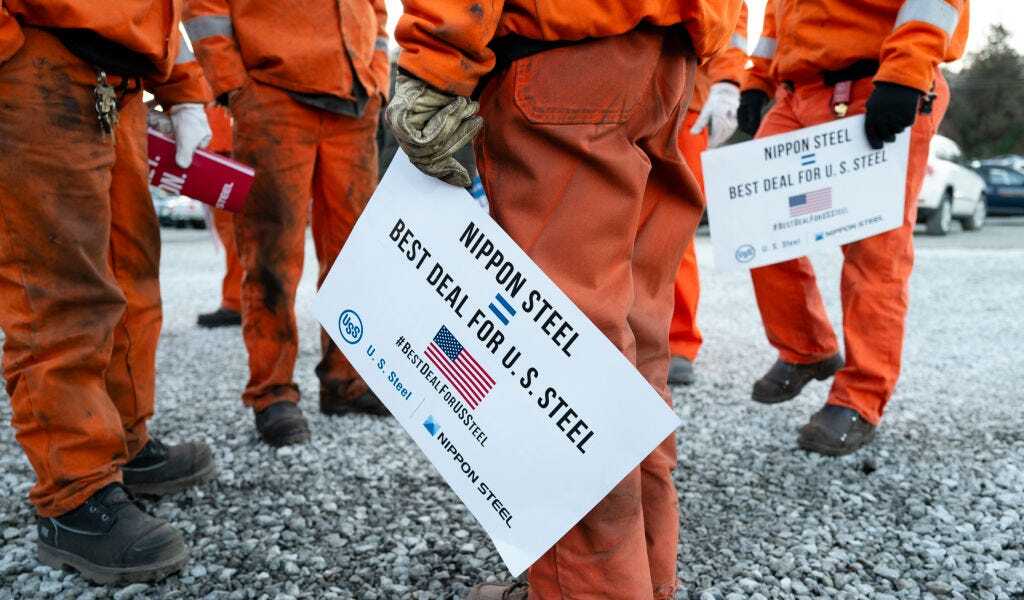- cross-posted to:
- [email protected]
- [email protected]
- cross-posted to:
- [email protected]
- [email protected]
By supporting the union? Cool story
You should read the article before commenting…
Biden supports unions the same way Trump does.
They both act and talk like they are for the working class, but in reality they continue to only help the owner class while giving crumbs to the working class.
He did so by blocking Japan’s Nippon Steel’s proposed $14.9 billion purchase of the once-iconic, now-declining U.S. Steel. The ostensible rationale was “national security.” As Biden put it in a statement Friday morning, “It is my solemn responsibility as president to ensure that, now and long into the future, America has a strong domestically owned and operated steel industry.” He added, “And it is a fulfillment of that responsibility to block foreign ownership of this vital American company.”
If only. Blocking the deal is just going to hurt the U.S. steel industry, and everyone in the industry, including the workers themselves, knows it. The real reason Biden stopped Nippon Steel from buying U.S. Steel was politics—a combination of placating his union allies and a misguided belief that U.S. Steel must remain in American hands at all costs. The irony is that this economic nationalism and union nostalgia could kill 3,000 union jobs and push U.S. Steel out of Pittsburgh.
During the election, the proposed takeover of U.S. Steel by a Japanese company became a heated issue in Pennsylvania. While Biden and Vice President Kamala Harris cited national security concerns, Donald Trump said in a Truth Social post that the tariffs he planned to place on imported steel would revive the industry. The far more likely result, however, is that Pennsylvania steelworkers will soon be out of work, as U.S. Steel had vowed to move to non-union Arkansas if its deal with Nippon Steel were turned down.
“If there’s no company, what good are tariffs?” said Andy Macey, a mechanical repairman at U.S. Steel’s Clairton Works. Macey, 70, was a steelworker in the 1980s when U.S. Steel, unable to compete with cheap foreign imports—much of it from Japan—began shutting down factories. “When I walked out of that steel mill with my coworkers, we had tears in our eyes,” he said, remembering the daily food and unemployment lines. Macey said that a locker buddy committed suicide the night he was laid off. He pushed for the Nippon deal because he didn’t want younger steelworkers to suffer the same fate.
Nippon Steel promised to invest $2.7 billion in U.S. Steel’s aging union facilities, including $1 billion in the Mon Valley. The Japanese even sweetened the pot with a $5,000 bonus for workers if the deal passed.
Local union leaders from two of the three Mon Valley plants supported Nippon, with Jason Zugai, vice president of USW Local 2227, saying that 95 percent of the union members at his Irvin Works support the deal. U.S. Steel’s corporate executives, elected officials, and hundreds of workers rallied to show their support in late November. That same month, Japanese prime minister Shigeru Ishiba warned in a letter to Biden that blocking the deal would “cast a shadow on the achievements you have accumulated over the past four years,” weakening an alliance critical to countering China.
Shortly before Christmas, the Committee on Foreign Investment in the United States, which is part of the executive branch and includes representatives from a number of cabinet departments, found itself unable to come to a unanimous decision about whether or not the Nippon Steel deal should be stopped. According to the Financial Times, the three most important committee members—the Treasury Department (which leads the committee), the State Department, and the Pentagon—found no security risks. In other words, in kowtowing to a union leader who has been a long-time political ally, Biden ignored the wishes of an important ally, Japan; members of his own cabinet; and the union workers themselves. He is also hurting the country, which would be far better served if Nippon Steel reinvigorated U.S. Steel, something it is uniquely positioned to do.
A final irony: On the same day Biden blocked the Nippon Steel deal on “national security” grounds, the U.S. approved the sale of $3.6 billion worth of air-to-air missiles to Japan.
That was a crazy read. There are still idiots out there who think they’re basically the same lol
Crumbs don’t make politicians union supporters, especially when they continue to hinder and block a union’s right to strike for better benefits and sick days.
Please, raise your standards.
I shared the post below with another fellow Lemmy user.
IMO: a well done video about the Railroad Strike and Biden, https://lemmy.world/post/24263602



